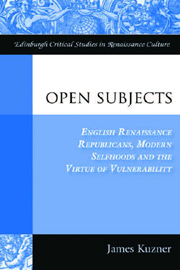Book contents
- Frontmatter
- Contents
- Acknowledgements
- Series Editor's Preface
- Introduction: Vulnerable Crests of Renaissance Selves
- 1 Legacies of Republicanism, Histories of the Self
- 2 ‘Without Respect of Utility’: Precarious Life and the Politics of Edmund Spenser's Legend of Friendship
- 3 Unbuilding the City: Coriolanus, Titus Andronicus and the Forms of Openness
- 4 ‘That Transubstantiall solacisme’: Andrew Marvell, Linguistic Vulnerability and the Space of the Subject
- 5 Habermas Goes to Hell: Pleasure, Public Reason and the Republicanism of Paradise Lost
- Epilogue: The Futures of Open Subjects
- Index
3 - Unbuilding the City: Coriolanus, Titus Andronicus and the Forms of Openness
Published online by Cambridge University Press: 12 September 2012
- Frontmatter
- Contents
- Acknowledgements
- Series Editor's Preface
- Introduction: Vulnerable Crests of Renaissance Selves
- 1 Legacies of Republicanism, Histories of the Self
- 2 ‘Without Respect of Utility’: Precarious Life and the Politics of Edmund Spenser's Legend of Friendship
- 3 Unbuilding the City: Coriolanus, Titus Andronicus and the Forms of Openness
- 4 ‘That Transubstantiall solacisme’: Andrew Marvell, Linguistic Vulnerability and the Space of the Subject
- 5 Habermas Goes to Hell: Pleasure, Public Reason and the Republicanism of Paradise Lost
- Epilogue: The Futures of Open Subjects
- Index
Summary
Introduction
In the previous chapter, I argued that Spenser follows Cicero in making shared vulnerability a definite good. For the bulk of this chapter, I focus on how Shakespeare portrays the founding of the Roman republic in Coriolanus; there, however, the emergence of the republic coincides not with the adoption of vulnerability as virtue but with a resolute (if empty) emphasis on the protection of Roman citizens. While Spenser suggests that the members of a polity must be open to self-risk, Shakespeare portrays a polity that offers to do the opposite: minimise vulnerability as much as possible.
In Coriolanus, Shakespeare views this offer as empty (that is, as both insincere and undesirable). And so he, like Coriolanus himself, searches for an alternative – one in which secure personal boundaries are, as in Spenser, not of primary importance. In the Rome of Coriolanus, this world would be socially unrecognisable, partly because Shakespeare presents such a dark picture of the construct of boundedness as to yearn to abolish the construct altogether. I hope to show, however, that if this makes Coriolanus the most utopian of my texts of focus, it also makes the play the most forceful statement both of the pitfalls of bounded selfhood and of the possible value of vulnerable life.
Typically, Coriolanus is read in a quite different fashion. At a couple of points I have said that for a large body of recent criticism, the political utility of early modern texts hinges on the degree to which they can be read as republican in a way that prefigures modern liberalisms and liberal subjectivities.
- Type
- Chapter
- Information
- Open SubjectsEnglish Renaissance Republicans Modern Selfhoods and the Virtue of Vulnerability, pp. 84 - 124Publisher: Edinburgh University PressPrint publication year: 2011



